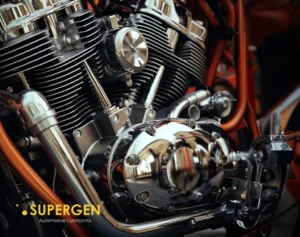Introduction:
Engine oil is the lifeblood of a motorcycle’s engine, providing crucial lubrication, cooling, and cleaning functions. While the basic purpose of engine oil remains consistent across all bikes, the idea that one type of oil fits all motorcycles is a common misconception. In this blog, we will explore the factors that determine whether engine oil is the same for all bikes or if each bike requires a unique formulation.
Understanding Engine Oil Basics:
Before diving into the differences, it’s essential to understand the fundamental role of engine oil. Engine oil lubricates moving parts, reduces friction, dissipates heat, and protects against corrosion and wear. The basic components of engine oil include base oils and additives that enhance its performance.
Oil Viscosity and Temperature Range:
Different motorcycles operate under varied temperature and stress conditions. Engine oils come in different viscosity grades, representing their flow characteristics at different temperatures. It’s crucial to select an oil with the right viscosity for your bike, considering factors such as climate and riding conditions.
Bike Type and Engine Design:
The type of motorcycle and its engine design influence the choice of engine oil. High-performance bikes, cruisers, touring bikes, and off-road motorcycles may have different requirements. Some engines, especially those with high compression ratios, may demand specialized oils to meet their unique needs.
Oil Additives and Specifications:
Manufacturers often recommend specific oil formulations for their bikes. These recommendations take into account the engine’s specifications and performance requirements. Some bikes may benefit from oils with specific additives, such as anti-wear agents or detergents, tailored to address the characteristics of the engine.
Synthetic, Semi-Synthetic, and Conventional Oils:
The choice between synthetic, semi-synthetic, and conventional oils is another factor to consider. While many modern bikes can use synthetic oils for enhanced performance and longevity, some older or specific models may require conventional oils. Understanding the compatibility of oil types with your bike is crucial.
Manufacturer Recommendations:
The motorcycle’s manufacturer provides detailed guidelines in the owner’s manual regarding the type, viscosity, and change intervals for engine oil. Deviating from these recommendations can impact the engine’s performance and longevity.
Conclusion:
In conclusion, engine oil is not a one-size-fits-all solution for motorcycles. The choice of engine oil depends on various factors, including bike type, engine design, operating conditions, and manufacturer recommendations. Selecting the right oil for your bike ensures optimal engine performance, longevity, and protection. Always consult your motorcycle’s owner’s manual and follow manufacturer guidelines to make informed decisions about the engine oil that best suits your bike’s needs. Remember, a well-maintained engine contributes to a smoother and more enjoyable riding experience.










